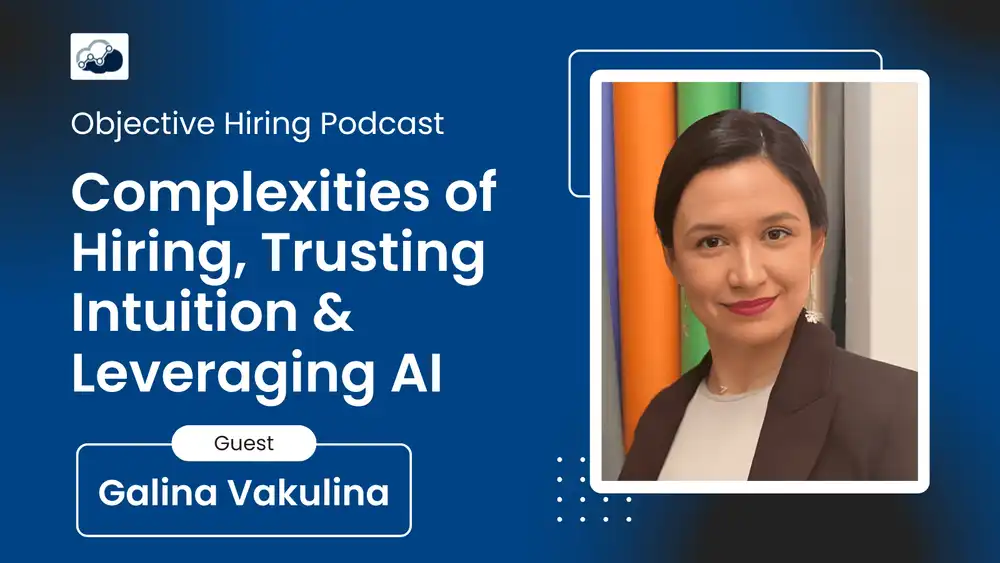Galina Vakulina on the Reality Check of AI in Hiring

Galina Vakulina (http://www.linkedin.com/in/galina-vakulina), Chief Data Officer at SME fintech platform Tochka, recently appeared on the Objective Hiring podcast hosted by Tim Freestone. During their conversation, they explored the growing complexities that artificial intelligence (AI) introduces to hiring processes.
The rapid adoption of AI tools has undeniably reshaped recruitment, providing streamlined solutions for screening vast numbers of applications. However, Galina points out significant challenges arising from the widespread reliance on these technologies:
"It's now a really big challenge for all the industry... there are bots for CVs that will adapt the CV for the role. There are bots for writing cover letters. There are bots for mock interviews. But where is the human?"
This influx of AI-driven applications often results in candidate profiles looking remarkably similar, creating confusion for hiring managers who must differentiate genuine candidates from artificially enhanced ones. Galina expresses concern that this homogenisation of CVs makes it challenging to identify truly skilled and motivated candidates:
"Candidates really can fit their CV to any role. There are special technologies that find a job posting, adapt your CV to it, and send it automatically. You don't do anything."
In practice, Galina emphasises that the initial appeal of efficiency through AI can quickly spiral into complexity, creating what she describes as a "mess" for recruitment teams. Recruiters now face an overwhelming volume of superficially suitable applicants, complicating the task of accurately assessing candidates’ true abilities and fit for a role.
Human Intuition: An Irreplaceable Asset
Despite the significant role that AI now plays, Galina argues passionately in favour of maintaining human intuition as a cornerstone of recruitment:
"As a hiring manager, when you talk to a person, it's okay if they don't have all the skills. You almost always know if this person is good or bad for the company. It’s a feeling, and I don't think we can teach AI to feel this connection between people right now."
This sentiment underscores the importance of personal interactions in the hiring process, something that AI technology struggles to replicate convincingly. Galina’s experience suggests that personal connections and gut feelings continue to inform successful recruitment decisions significantly, especially when evaluating a candidate’s compatibility with organisational culture and values.
The Risk of AI Dominance in Recruitment
One significant risk identified by Galina is the reliance on AI that may ultimately devalue human judgment. She notes that recruitment could devolve into a purely transactional interaction between candidate bots and recruiter bots:
"I see a future where, on one side, it will be AI recruiters, and on another side, AI doubles of candidates, and they talk to each other. That's it—there is no human."
Such a scenario could diminish the authenticity of the recruitment process, with decisions based purely on matching keywords and surface-level criteria. Galina argues this would neglect essential soft skills and cultural fit factors that fundamentally influence workplace success.
Finding Balance: Combining AI and Human Judgment
Rather than dismissing AI outright, Galina suggests a balanced approach, integrating AI-driven tools with human intuition. She sees potential in using AI for initial candidate screening, thus reducing biases and providing a fairer first-pass evaluation:
"I totally agree that AI could at least improve the initial step, as currently, a human reading a CV brings inherent biases. AI, theoretically, could screen without bias."
However, Galina also warns against relying solely on AI-generated results, advocating instead for human oversight to capture nuances missed by technology, such as genuine personality traits and authentic candidate motivation:
"Sometimes candidates really put themselves into their cover letters; they put their souls into connecting with the hiring manager. If AI checks everything, it won't distinguish this personal effort."
This viewpoint highlights the necessity of a dual strategy in recruitment: leveraging AI for efficiency and consistency while preserving the human component for depth and genuine insight.
Galina’s Vision for the Future of Recruitment
Reflecting on how recruitment might evolve, Galina envisages a scenario where AI might contribute more meaningfully to soft skills evaluation and organisational fit assessments, which remain challenging areas for recruiters:
"Using AI could become more useful when we talk not just about hard skills but also about soft skills and the candidate's profile, checking if they fit the company's values."
This vision suggests a future where AI complements human decision-making rather than replacing it, enhancing the overall quality and objectivity of the recruitment process.
The Need for Authentic Data
One of the central challenges in effectively deploying AI in hiring is ensuring the authenticity and reliability of data used. Galina highlights the potential for future developments where authentic candidate data could play a crucial role:
"If candidates are willing to talk honestly about themselves, we might develop applications matching roles accurately to candidates. This must be based on real, honest data—not just AI-generated content."
She suggests the potential for new recruitment products that draw directly from verifiable, real-world sources of candidate performance data, such as internal references or direct task performance measurements.
A Cautiously Optimistic Outlook
Although acknowledging the current complexities AI brings, Galina remains cautiously optimistic. She predicts a turbulent but ultimately constructive evolution in recruitment practices:
"I have a feeling it might get worse before it gets better."
Recruitment, therefore, stands at a critical juncture. Organisations embracing a balanced approach, harnessing the power of AI without surrendering the essential human element, are likely to emerge with superior talent acquisition capabilities.
Ultimately, Galina Vakulina's insights point toward a strategic blend of technology and intuition as the optimal path forward. For companies aiming to balance these elements effectively, Alooba's skills assessment platform provides a practical solution for objectively measuring candidates' skills and potential. Sign up to Alooba here and discover how to make your hiring fairer, quicker, and more effective.